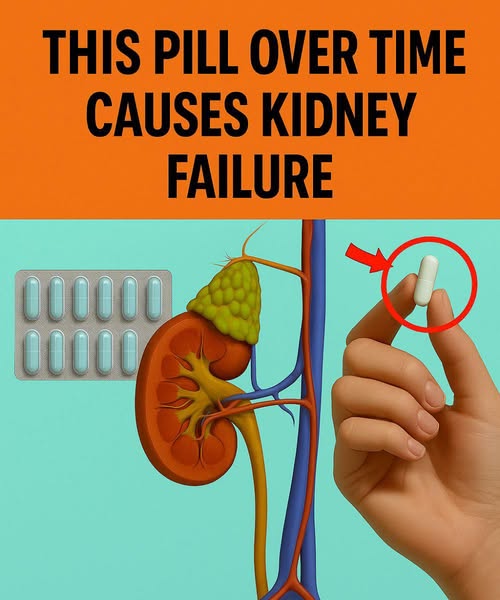Kidney health is often ignored until the first serious symptoms appear. Many people do not pay attention until a urine test reveals the presence of albumin, a protein that may indicate kidney damage.
Over 800 million people worldwide face chronic kidney disease, often without noticeable warning signs. This makes early diagnosis crucial to prevent serious damage.
One of the most significant factors affecting kidney health is the excessive or improper use of certain medications. Many patients are unaware that everyday drugs can pose risks to their kidneys.
In this article, we will outline some of the most common medications that, if used without medical supervision, can harm or compromise kidney function. This information is vital for anyone wishing to protect their kidney health.
1. Omeprazole and other proton pump inhibitors (PPIs) are commonly used to treat reflux, heartburn, and ulcers. However, prolonged use without medical supervision can cause acute or chronic kidney damage.
The use of these medications should always be evaluated by a specialist. Self-medication can be dangerous, especially for people who already have kidney problems.
Safer alternative: H2 antagonists, such as famotidine or ranitidine, are generally safer for individuals without pre-existing kidney damage. These medications can be a first option for managing reflux.
2. Ibuprofen and other non-steroidal anti-inflammatory drugs (NSAIDs) are widely used for pain and inflammation. However, they can reduce blood flow to the kidneys and cause acute kidney injury, especially in older adults.
The risk increases with long-term use or high doses. Therefore, their use should be limited and monitored by a physician.
Improper use of NSAIDs can also lead to chronic complications, including gradual loss of kidney function over time.
3. Pain relievers such as aspirin, naproxen, and diclofenac can cause fluid retention, increased blood pressure, and chronic kidney disease if overused.
Symptoms include bloating, fatigue, nausea, and reduced urination. These signs should not be ignored and require medical consultation.
People with a family history of kidney disease should be particularly cautious with these medications.
4. Aminoglycoside antibiotics, such as gentamicin or amikacin, are effective against serious infections but can cause nephrotoxicity. This directly affects the nephrons, the part of the kidney that filters blood and produces urine.
Use of these antibiotics requires strict monitoring by specialists to prevent permanent damage.
If you feel fatigued or notice kidney pain while taking these medications, you should contact your doctor immediately.
5. Lithium for bipolar disorder is another drug that requires caution. Long-term treatment can cause kidney failure and nephrogenic diabetes insipidus.
Patients on lithium should have regular monitoring by both nephrologists and psychiatrists to ensure kidney function remains stable.
6. Diuretics, while helping to control hypertension and fluid retention, increase the workload on the kidneys.
Using them without control can lead to dehydration, electrolyte imbalance, and kidney failure over time.
7. Blood pressure medications, especially renin-angiotensin system (RAS) inhibitors, can gradually affect kidney function.
Although these drugs are essential for controlling hypertension, they should not be discontinued without medical advice. Abruptly stopping them can be dangerous.
Tips for protecting kidney health: Regular blood pressure checks are essential. High blood pressure can progressively damage the kidneys.
Maintaining a healthy weight also helps reduce the strain on the kidneys and supports their normal function.
Controlling blood sugar levels is crucial for diabetics. Uncontrolled diabetes can cause irreversible kidney damage.
Regular urine tests can detect proteinuria early, allowing intervention to prevent disease progression.
Avoiding self-medication is essential. Even over-the-counter drugs can cause serious harm if used improperly.
Avoiding harmful habits such as smoking and excessive alcohol consumption also helps maintain kidney health.
Controlling cardiovascular factors like cholesterol and triglycerides is equally important. Heart and blood vessel diseases often accompany kidney damage.
A healthy diet and regular physical activity support optimal kidney function and overall health.
Medications should always be used under the guidance of a physician, considering personal history and current health status.
Periodic monitoring of kidney function through laboratory tests helps detect any problems early.
Drinking enough water throughout the day helps keep kidneys hydrated and aids in toxin elimination.
Careful use of anti-inflammatory medications is essential, especially for individuals over 50 or with a history of kidney disease.
When using potentially nephrotoxic antibiotics, monitoring drug levels and kidney function prevents damage.
For patients taking lithium, regular checks of creatinine levels and electrolytes help prevent complications.
Diuretics should be used in appropriate doses and monitored regularly to avoid dehydration and electrolyte loss.
Individuals on blood pressure medications should frequently monitor both their blood pressure and kidney function to ensure optimal effect and safety.
Kidney health requires a comprehensive approach: blood pressure control, healthy diet, physical activity, and careful use of medications.
In conclusion, kidneys are important indicators of overall health. Proper care, avoiding self-medication, and regular monitoring can prevent significant damage and maintain quality of life for many years.
